Scat, Skeeters!
Check your yard for standing water that has accumulated in objects such as tires, gutters, hubcaps, and tarps over equipment. Even a bottle cap can harbor mosquito larvae.
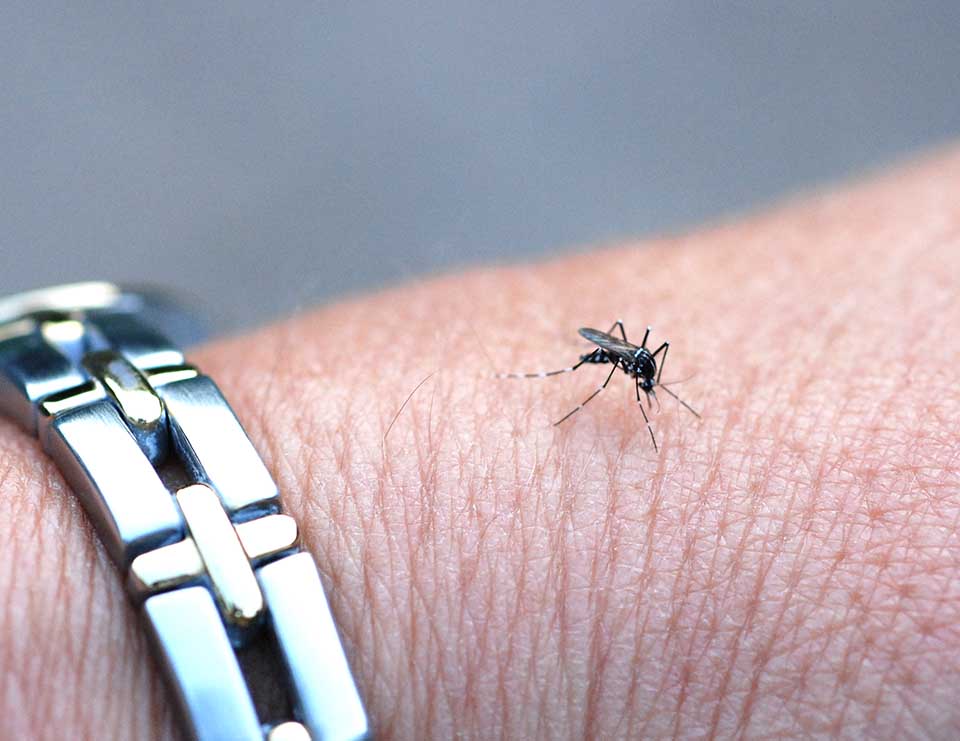
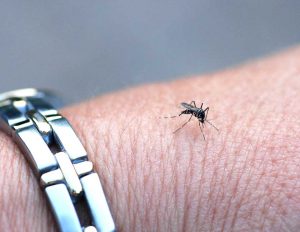 In the fall mosquitoes are often bothersome. Maybe they’re more noticeable to me then because I’m outside more at dawn and dusk as the days get shorter and cooler. We’ve had a dry summer but any rain may increase their numbers. Until the temperatures dips below 50° F., causing mosquitoes to become dormant, they will be looking for a blood meal—and I’d rather that wasn’t me.
In the fall mosquitoes are often bothersome. Maybe they’re more noticeable to me then because I’m outside more at dawn and dusk as the days get shorter and cooler. We’ve had a dry summer but any rain may increase their numbers. Until the temperatures dips below 50° F., causing mosquitoes to become dormant, they will be looking for a blood meal—and I’d rather that wasn’t me.
Mosquitoes can harbor many devastating organisms such as those that cause malaria, yellow fever, dengue, West Nile virus, and Eastern Equine Encephalitis (EEE). Each year the latter two are found in Cumberland County as well as in other New Jersey locations. Fortunately it is rare that you hear of people here contracting any of the human diseases, but nevertheless mosquitoes are clearly a nuisance and can also have quite serious impacts.
Other animals besides humans are adversely affected by mosquitoes, in particular dogs and cats. Without proper care they are prime candidates for heartworms carried by mosquitoes. A regular dose of heartworm preventative is far preferable to the need for expensive and lengthy treatments. Local horses have died from EEE.
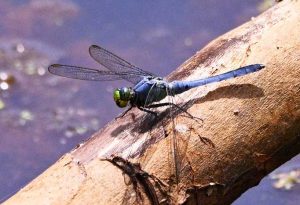
Before I reiterate past advice on how to reduce or eliminate mosquito numbers on your property it’s important that we have a little chat about insects. An entomologist friend has suggested, when I keep pointing out what a dandy job birds do of controlling insects, that I may have been leaving readers with the impression that bugs are bad. So let me be very clear: Insects are essential to life on earth—yes, even the ones we loathe. We would be waist-deep in carcasses and have no topsoil if it weren’t for decomposers like beetles, flies, maggots, and thousands of others. And our tables would lack most fruit, vegetables, and even meat.
Here are some important statistics and facts to consider:
The leading international journal in conservation science is Biological Conservation. In 2019 it reported a 40 percent decline in insects globally.
The U.S. Department of Agriculture’s Natural Resource Conservation Service notes that three-fourths of the world’s flowering plants and 35 percent of the world’s food crops depend on pollinators—that’s right, “bugs”—to reproduce.
Our meat and dairy products are reliant on insects, too. For example, cattle are fed alfalfa, a grain that grows via pollination by insects.
The decrease in songbird populations is directly linked to the demise of insects and the degradation and loss of their shared habitat. In a follow-up article, we will talk further about the devastating decline of our six-legged friends.
Consider this grim truth: John Flesher of the Associated Press reported that 70 percent of pest control companies surveyed in 2021 offered spraying services for mosquito control. This is an increase of 38 percent since 2014. And mosquito services generated nearly one-fifth of their revenue in 2021.
Unfortunately, most sprays don’t differentiate between a mosquito and a bee or butterfly, or any pollinator or decomposer, for that matter. They are indiscriminate, meaning that when you apply a pesticide you are often killing the very bugs we need to live. So spraying should be a last resort; in fact I would go so far as to say “don’t spray.”
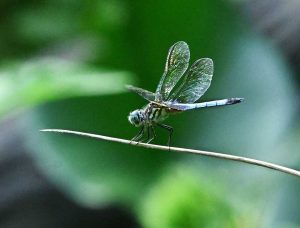 There are many easy and harmless ways to reduce mosquitoes.
There are many easy and harmless ways to reduce mosquitoes.
The most basic and first advice is “Clean up your act.” Yup, there it is, I said it; as in most cases in my life I have found the enemy, and it is us. Standing water is the key component of the mosquito’s life cycle that you need to eliminate. The adults must lay their eggs in water, and something as small as a child’s plastic toy can be an offender—a frisbee left outside, a plastic toy car. Some major culprits are tires, gutters, hubcaps, puddles, a tarp over equipment, the top of a rain barrel, or litter—especially plastic litter, but anything that can hold water. Today’s reliance on impermeable plastics has truly exacerbated the problem. A full bottle cap can comfortably sustain 100 mosquito larvae!
I attended a lecture on mosquito control and one item that the expert pointed out as a haven for larvae is the accordion-like downspout extensions. She said that for many folks whose property she has inspected this has been a major source of infestation. Homeowners should choose pipe extensions that are straight, smooth, and pitched instead, because each accordion fold holds water and can support thousands of unwanted guests.
If you have junk, you need to declutter. If anything retains water it’s a problem; sometimes an item can simply be turned over. Don’t let water sit for more than five or six days, since it takes seven to 10 days from egg to adult. I recommend a five-day limit in hopes of foiling my own forgetfulness. So if you have a birdbath, empty it often and keep it fresh. Scrub out containers that may have leftover eggs. Dump and drain water from all outdoor receptacles.
Fall brings more leaves collecting on your roof, making it that much more important to make sure your gutters are pitched and clean.
If you have an area where soil is compacted and water puddles, take a pitchfork and loosen the earth to allow water to percolate downward.
Consider placing a water container laced with BTI, either a dunk or granules, at the base of some plants; this will attract egg-laying adults, to an unproductive solution.
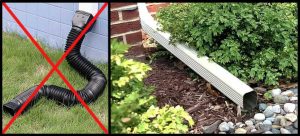
If you have a pond, support frogs and don’t introduce fish; fish eat frogs and frogs are more beneficial. Goldfish and most other fish sold for backyard ponds are not native; when they get into the waterways, and they will, it spells trouble.
How about gambusia (commonly called mosquito fish)? Well, that’s a loaded question. There is a lot of controversy in the environmental community about introducing a non-native species that competes with our own fish. There are also questions about their effectiveness. So rather than enter the debate, let’s just go with frogs, dragonflies, and cleaning up our act.
Your mission is to stop the little buggers in their larval stage, because adults often mean bites. And let me repeat for clarity’s sake: You need to get rid of standing water.
If you have done proper recognizance on your property and mosquitoes are still a nuisance in your yard, or nearby properties are harboring them, call Cumberland County Mosquito Control at 856-453-2170. (If you’re from another county in southern New Jersey, contact your county office for the proper control unit.) Since mosquitoes are a health risk, county inspectors can look at neighboring properties and make sure that they too clean up their act. These services are free of charge, so no excuses!
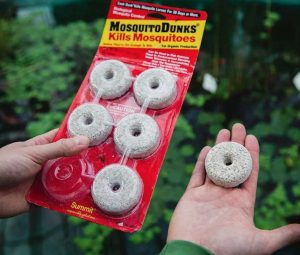
So you’re still bugged? There are many repellents, both natural and chemical, like DEET. Some people swear by homemade solutions. Most involve various essential oils like eucalyptus and lavender, or herbs like rosemary, basil, and witch hazel, mixed in alcohol or vodka. I’ve tried a number of these and I’d prefer to drink the vodka. I have bought and tried many “natural” products and though I can’t say I’ve had much luck with them, surely some will prove effective for many people. Scientists are studying why some individuals attract mosquitoes more than others. So it stands to reason that what works well for one person may not be as effective for someone else.
The art of not being bitten is more extensive than the space allowed here, but there are a couple of tips. The insects are most active in the early morning and at dusk. Wear long sleeves and pants. And my favorite tip—don’t scratch. Most bites go away in about 45 minutes if left alone.
We didn’t touch on the various breeds of mosquitoes. We have natives, but many varieties come here from all over the planet, in the bilges of ships and probably even in bottle caps. As a result new diseases are always a possibility.
So the best advice is “Clean up your act, and avoid spraying.”






